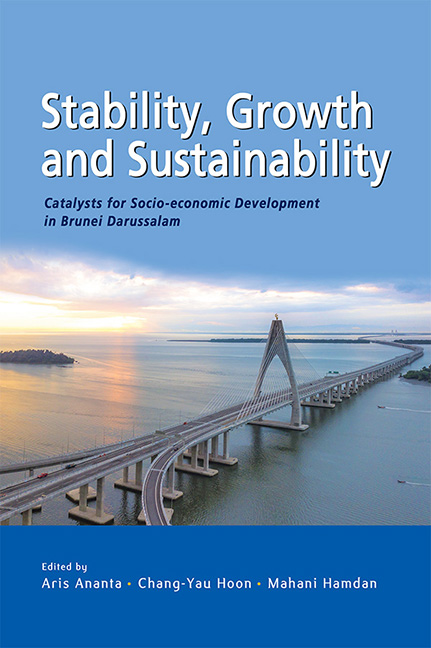2 - Brunei in Historical Context: Governance, Geopolitics and Socio-Economic Development
Published online by Cambridge University Press: 10 January 2024
Summary
INTRODUCTION
Brunei is a predominantly Muslim country with a population of 459,500 in 2019 (Department of Economic Planning and Statistics 2019). As one of the oldest monarchies in the world, the sultanate of Brunei began in the fourteenth century when Awang Alak Betatar converted to Islam and married a Johore princess. He was coronated as the first Sultan of Brunei in 1368 and became Sultan Muhammad Shah. Despite political turbulences, foreign interference, economic instability and substantial territorial loss at the end of the nineteenth century, the monarchical system remains intact until the present day.
There are many factors that contributed to the continued existence of Brunei’s monarchical system. Hamzah (1989) considered the skilful tact, diplomacy and political experience of the Brunei Sultans in dealing with external pressures as the main factor that overcame the political deficiency that could jeopardize the integrity of the monarchical system. Whereas Talib (2013) emphasized “the traditional and religious sources of legitimacy” from which the Brunei monarchy draws its strength as fundamental to the country’s survival.
In the present day, Brunei’s monarchy implements a unique governance model that strikes a balance between tradition and modernity. The traditional components are solely implemented in the royal court whereas the modern elements of governance shape the present-day state administration (Asiyah az-Zahra, Siti Norkhalbi and Noor Azam 2017, pp. 4–5). As will be discussed later, this unique model shapes what Talib (2013) regarded Brunei as a neo-traditional polity that enables the country to respond well to the changing needs of the modern globalized world.
THE BRITISH RESIDENCY 1906–59)
Before the turn of the twentieth century, Brunei was in a deep political crisis, following a substantial territorial loss to the Brookes in Sarawak and the British North Borneo Chartered Company in the present-day Sabah. By the turn of the century, Brunei was truly desperate to retain and ready to fight for what was left of its sovereignty. After several pleas made by Sultan Hashim (r. 1885–1906), the British agreed to the establishment of the British Residency in Brunei. With the signing of the Supplementary Agreement between Brunei and Britain in 1905/1906, Malcolm McArthur was appointed as the first British Resident.
- Type
- Chapter
- Information
- Stability, Growth and SustainabilityCatalysts for Socio-economic Development in Brunei Darussalam, pp. 26 - 48Publisher: ISEAS–Yusof Ishak InstitutePrint publication year: 2023



